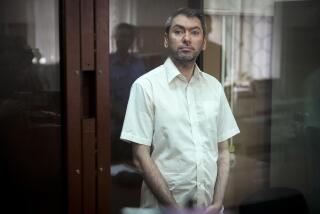Making Sakharov Immortal : Science: A panel of his peers, dedicated to fulfilling his goals, would be a fitting memorial.
- Share via
Andrei D. Sakharov’s accomplishments will live for all time. His scientific work by itself would have brought him world reknown. His thinking through of the links between security and human rights, for which he received the Nobel Peace Prize, would also, by itself, have made him deservedly famous. But in addition, he practiced what he preached. He set a record for stubborn courage and resistance to tyranny, and in so doing drew attention to his ideas and to human-rights problems.
The world needs a suitable memorial for Sakharov. In thinking through various possibilities, the Federation of American Scientists was struck by one of his unfulfilled proposals. In his acceptance speech for the Nobel Peace Prize in 1975, he said about some of his proposals of a “general nature”: “First and foremost is the idea of setting up an international consultative committee for questions related to disarmament, human rights and the protection of the environment, under the aegis of the United Nations. In my opinion, a committee of this kind should have the right to exact replies from all governments to its inquiries and recommendations.”
What we think he had in mind was something like an international version of what was once the U.S. President’s Science Advisory Committee. A limited number of very distinguished scientists and practitioners from diverse parts of fields in question--disarmament, human rights and the environment generally--would be convened. (Certainly, Sakharov meant “environment” to include the areas of development, health, food and education that figured in his famous treatise on coexistence.)
The members would be people in Sakharov’s tradition: men and women of proven accomplishment, who had shown a willingness to speak truth to power and who had a transnational perspective.
Needless to say, a limited group of experts could not cover all relevant fields of science and human rights. But they would know whom to call on for the workshops or reports required to investigate specific topics. And they would be able to assess the merit of the conclusions.
What would and could this group do that others are not doing? It has long been understood that issues of environment and world development are closely related to issues of military spending, since both sectors draw on the same resoures. But Sakharov’s contribution, as the Nobel Committee put it, was to emphasize that human rights were the “only sure foundation for a genuine and long-lasting system of international cooperation”--in short, that human rights and military security were connected. Accordingly, in Sakharov’s political consciousness, what the Nobel Committee identified as his goals of “demilitarization, democratization of society in all countries and a more rapid pace of social progress” were linked together.
This high-level perspective is a legacy of Sakharov. A Sakharov consultative committee, made up of activists in the relevant fields who share his global vision, could discuss the evolving issues from his perspective. Its approach to problems would not only be interdisciplinary; it would reflect as well a sense of the inter-relatedness of the goals to be achieved. Working together, the participants would help one another achieve and maintain the integrated approach that the single mind of Andrei Sakharov was able to attain. Pronouncements from this committee would keep alive Sakharov’s pragmatic vision.
Because of their distinction, the members of the committee would be able to call the world’s attention to their conclusions.
Such an organization could, of course, associate itself with the United Nations as a non-governmental organization. We doubt that it would want to be “under the aegis” of the United Nations in some other sense, The meritocracy of science is at odds with the inevitable politicization of the United Nations.
We propose a fixed term of several years of service on the consultative committee, followed by a period away from the body so that a corps of committee graduates would be built up to draw upon in the future and to keep new ideas flowing through the panel.
The committee, organized in this way, would, among other things, give a deserved new status to activists in science and society issues. At present, public-interest scientists are generally viewed as a species of scientists-gone-public, and they generally lack their own scientific societies and a sense of shared problems and shared ethical dilemmas. Over time, the graduates of this consultative committee would become, in effect, a kind of international academy of public-interest scientists and human-rights specialists who could become models for others.
We believe that a free-floating group of this kind could, because of its distinction, its high purpose and its cost-effectiveness, be funded from independent philanthropic purposes for the limited sums it would require to fulfill its mandate. It would not, after all, be making grants to others. Instead, it would simply require funds to hold its meetings, convene its workshops and fund its studies and reviews.
As for selection, we believe that the committee should perpetuate itself through its own measures to elect new members.
But how to convene the initial body? One method would be to issue a call to organizations involved in the subjects at issue to nominate suitable candidates. Then a distinguished group of very senior scientists and statesmen, largely too old or too busy to function in the group itself, would make the initial choice. This would lend prestige to the initial group and call attention to its existence. The idea will be proposed by the FAS at a scientific forum in Moscow later this month.
More to Read
Sign up for Essential California
The most important California stories and recommendations in your inbox every morning.
You may occasionally receive promotional content from the Los Angeles Times.













